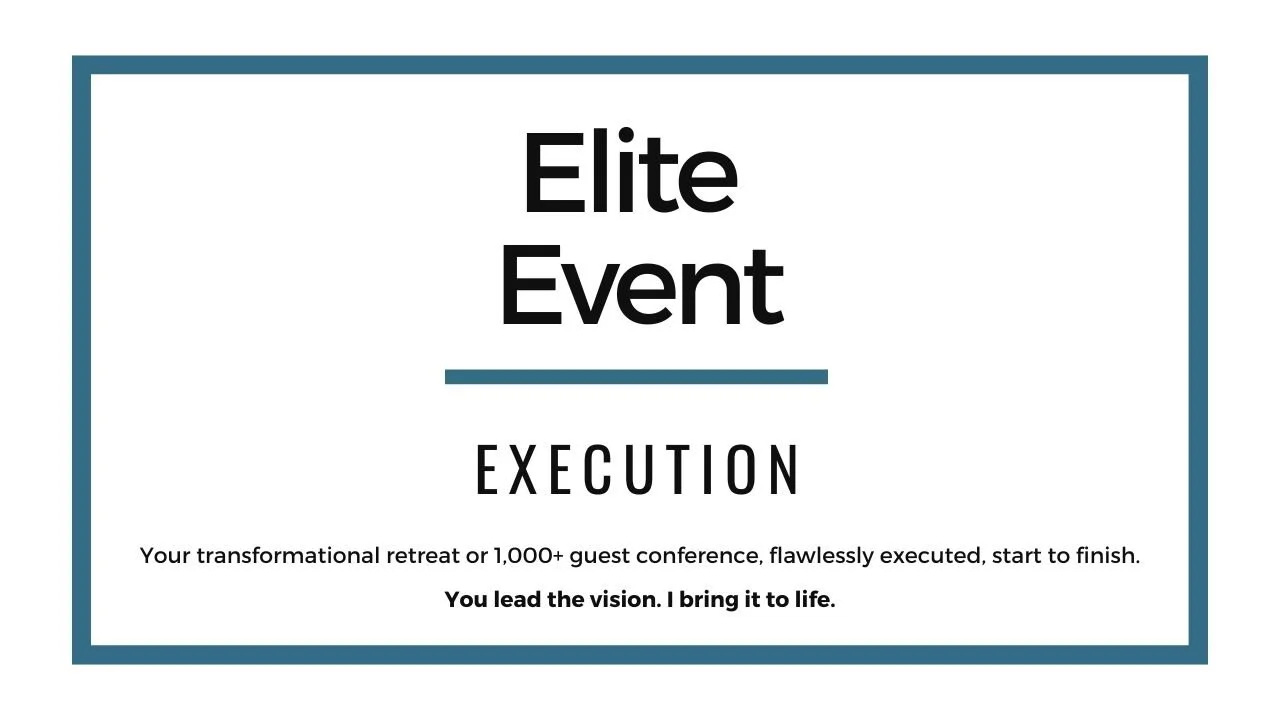Delegate Like a Leader: What Not to Take On When Running a Retreat
If you’ve ever felt like running a retreat means juggling every single detail yourself, it’s time to rethink that model. This post breaks down what truly belongs on your plate as the host and what doesn’t. Whether you’re leading your first retreat or your fifth, learning to delegate well is what helps you lead with clarity, connection, and confidence.
The Smart Way to Host a Retreat: What to Own and What to Let Go
Prefer to watch? The full breakdown is in the video below. Otherwise, let’s dive in.
You’re Here to Lead, Not Manage
As the host, your role is not to chase vendor emails, confirm transport logistics, or triple-check the seating chart. You’re the one guiding the guest experience, not running operations behind the scenes. But too often, retreat leaders feel like they have to do everything in order for it to go right.
When your attention is constantly on task lists and timelines, you’re no longer fully present. The subtle moments that make a retreat memorable (welcoming a nervous guest, tuning into the room’s energy, holding space for conversation) are much harder to catch when your head is spinning with to-dos.
Leading well starts with being present, and when your focus is pulled in ten different directions, your energy (and your guests) feel it.
What You’re Meant to Focus On
So what’s actually yours to own? Let’s break down your most important responsibilities as the retreat leader.
1. Holding the Vision and Purpose
You’re the one who understands the “why” behind this retreat. Why it exists, why your guests showed up, and why it matters now. Your job is to keep that purpose front and center, not buried under logistics.
2. Setting the Tone
Your energy shapes the room. When you’re calm and grounded, your guests can settle in too. When you’re rushed or distracted, the space takes on that energy. You’re not just leading a schedule, you’re guiding how the retreat feels.
3. Leading the Sessions and Guest Connection
You’re the voice and the presence your guests came for. Whether you’re teaching, facilitating, or creating space for conversation, your ability to connect with guests is what leaves a lasting impact. That connection suffers when you’re stuck managing details behind the scenes.
What You Can (and Should) Hand Off
Delegating isn’t about stepping away from what matters. It’s about making room to do what matters best. Here’s what doesn’t need to stay on your plate:
Vendor Communication
Let your support team handle confirming room setups, transport, catering orders, and other vendor details. These logistics are important, but they don’t require your constant oversight.
Logistics and Checklists
Welcome gifts, printed materials, name tags, signage, and seating plans- these are better managed by someone else. Have a team member track and execute these details so you can stay focused on your guests.
Timelines and Daily Flow
Yes, you’ll create the schedule, but once the retreat starts, your team should manage the run of show. That includes coordinating room setups, timing transitions, AV setup, and more. You’re there to keep guests engaged, not to clock-watch.
Administrative Details
Guest lists, food preferences, and last-minute adjustments, these are exactly the type of tasks that drain energy if they’re not handed off. Free yourself from the minutiae so you can stay connected in the moment.
Set Your Support Team Up the Right Way
Even if you’re only working with a virtual assistant, a co-host, or one on-site helper, the secret to a smooth retreat is preparation. Here’s how to set your support up to actually support you.
Create a Clear Timeline
This should outline exactly what’s happening, when, and who’s responsible. When people can see what’s expected, they don’t need to check in with you for every step.
Use a Shared Logistics Document
Keep all retreat details (vendor contacts, guest notes, AV needs, menus, room assignments) in one accessible spot. Whether it’s Google Docs, Sheets, or a checklist tool, make sure it’s easy for your team to find answers without coming to you.
Assign Tasks Visibly
Track what’s been assigned, who’s handling it, and what’s still pending. Tools like Asana, ClickUp, or even a simple spreadsheet work perfectly. When tasks are documented and visible, you can stop micromanaging, even with a small team.
Hold a Pre-Retreat Sync
Before your retreat begins, meet with your team to walk through responsibilities, communication tools, and key documents. Use this time to catch any gaps and clarify who’s doing what.
Do Daily Check-Ins On Site
A 10-minute huddle at the end of each day can prevent big issues for the next. Use this time to review what went well, flag any concrns, and prep for the next day’s flow.
The Cost of Doing It All Yourself
Trying to manage every piece of your retreat doesn’t just create stress. It comes at a real cost.
You lose energy.
Carrying it all in your head drains you fast. When you’re mentally juggling the backend, you miss being able to show up full in front of the room.
You lose connection.
Even if you’re physically present, your guests can feel when you’re mentally distracted. That affects the experience they have and the impact you’re trying to create.
You lose the joy of hosting.
When you’re buried in logistics, your retreat starts to feel like a task list. You miss the moments that make it meaningful for them and for you.
You lose focus of what matters.
It’s hard to guide a meaningful experience when you’re managing everything behind the curtain. When you’re pulled away from your guests, you miss the very reason the retreat exists.
You Don’t Have to Carry It All
You can lead with clarity. You can show up for your guests. And yes, you can actually enjoy the retreat you worked so hard to plan.
Whether you’re looking for help with building your plan, creating team systems, or handing off the logistics entirely, I support leaders like you every step of the way.
If you’re ready to focus on leading instead of managing, check out my Event Logistics and Planning Support services to learn more about how I can assist you and your retreat planning experience.
Remember: Leading well isn’t about doing it all. It’s about knowing what’s yours to carry and letting go of the rest.



